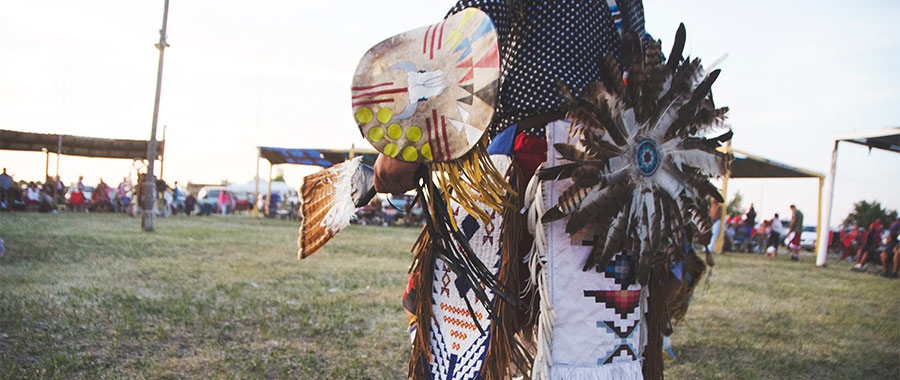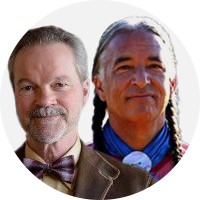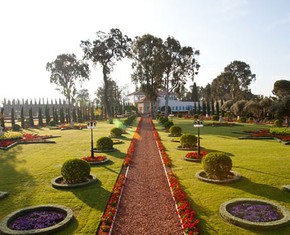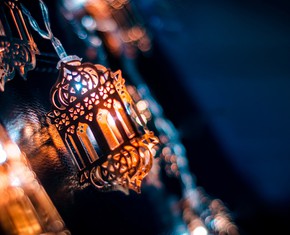The views expressed in our content reflect individual perspectives and do not represent the authoritative views of the Baha'i Faith.
As the conversation about Indigenous messengers of God continues in this series of essays, Christopher Buck asks Lakota artist and author Kevin Locke to weigh in on cultural misappropriation.
Q: Kevin, what can we do about cultural misappropriation? Many people have spoken out about athletic teams that have taken on “Indian” names and mascots—such as, in professional baseball, the Cleveland Indians and the team’s mascot, “Chief Wahoo.” Or the Atlanta Braves, with their former mascot, “Chief Noc-A-Homa,” until the 1983 season, along with “Princess Win-A-Lotta,” dropped at same time as Noc-A-Homa, followed by “Tomahawk Chop,” adopted in 1991 and still in use, as far as I know. I’m sure you can think of many other examples.
A: Team sports might represent the best example of cultural/spiritual misappropriation of Indigenous cultures like mine. First, let’s look at a little historical information that many may not know.
Team sports, as we know them today, did not exist outside of the Western hemisphere before 1492. The earliest Western sporting events, like the Olympics in ancient Greece, relied primarily on contests between individual athletes. Throughout the Western hemisphere, Indigenous team sports were, and still are, used as a devotional practice. In those practices, the ball symbolizes divine favor, and the opposing teams symbolize the dialectic of contrasts in all the realms of God, both seen and unseen.
For example, the Haudenosaunee (Iroquois) call lacrosse “the Creator’s game.” In the Southeast, the Cherokee “stick ball” is always a part of the Green Corn Dance—the central devotional practice of that region. In my culture, the Lakota Tȟápa Waŋkáyeyapi “Tossing The Ball Up” sport is one of the foundational prayers.
Apparently cultural misappropriation occurred when the European immigrants first witnessed these devotional practices, these team sports, and inappropriately adopted them. It may have been the first instance of cultural appropriation. Consequently millions or even billions worldwide now addictively watch these practices, and some even deify and worship the participants!
The Indigenous prophecies attached to this and many other similar misappropriations foretell that sad cultural condition, and point to this mindless ignorance as a sign of the crying need for spiritual renewal.
Q: Since cultural appropriation has become such a highly charged, politically incorrect practice, can you think of another term—even if you have to invent one—for recognizing and respecting Indigenous spiritual heritages, both within the Baha’i community, and in society at large?
A: As we all disengage from the dark place where cultural misappropriation occurs, and collectively move into the light of truth, then we can happily discard these terms that define such a limited mindset. In all of my programs, I incorporate participation in music and dance so that folks can escape the disconnect in which differentness equals otherness. Through engagement with each other and with each other’s cultures, we can begin to take ownership to internalize and integrate diverse cultures and see that we can, and should, see ourselves as legitimate heirs to all the treasures of humankind—material, cultural and spiritual. The Baha’i teachings call upon all people to work together to establish that exact sort of universal oneness:
I beg of God to strengthen these spiritual bonds as day followeth day, and make this mystic oneness to shine ever more brightly, until at last all shall be as troops marshalled together … within the sheltering shade of the Word of God; that they may strive with all their might until universal fellowship, close and warm, and unalloyed love, and spiritual relationships, will connect all the hearts in the world. Then will all humankind, because of this fresh and dazzling bounty, be gathered in a single homeland. Then will conflict and dissension vanish from the face of the earth, then will mankind be cradled in love for the beauty of the All-Glorious. Discord will change to accord, dissension to unison. The roots of malevolence will be torn out, the basis of aggression destroyed. The bright rays of union will obliterate the darkness of limitations, and the splendours of heaven will make the human heart to be even as a mine veined richly with the love of God. – Abdu’l-Baha, Selections from the Writings of Abdu’l-Baha, pp. 19-20.
Q: Besides contributing to what academics refer to as “spiritual literacy,” isn’t this oneness a good thing, Kevin? If so, should we all promote this kind of spiritual literacy, recognition and respect for sacred Indigenous traditions?
A: Yes. In a word, let’s transform “cultural (mis)appropriation” into “intercultural appreciation”—with all of the mutual respect and reciprocity it entails, while expanding and enriching our “spiritual literacy.”
For instance, the sacred teachings of Deganawida, the Peacemaker, as enshrined in Concerning the League (recited by Chief John Arthur Gibson in 1912)—a great holy book that we should consider part of the world’s sacred literature—offer an excellent way for all of us to expand and enrich our spiritual literacy. Certainly we can all know about these powerful traditions without misappropriating them.
In fact, public knowledge of all things Indigenous—such as recognizing and respecting the great Indigenous messengers of God as part of our global heritage—can be a good thing, especially if it enhances and ensures “unity in cultural biodiversity.” As Baha’u’llah wrote:
The most glorious fruit of the tree of knowledge is this exalted word: Of one tree are all ye the fruit, and of one bough the leaves. Let not man glory in this that he loveth his country, let him rather glory in this that he loveth his kind. – Tablets of Baha’u’llah, pp. 127–128.
















Comments
Sign in or create an account
Continue with Googleor